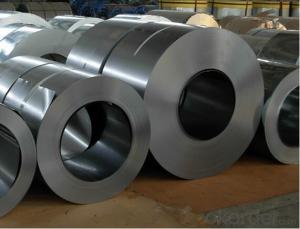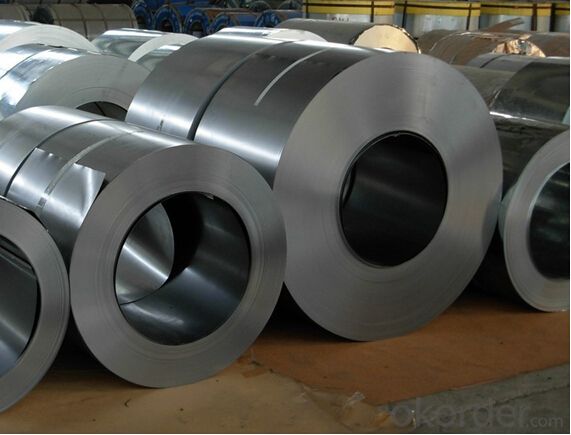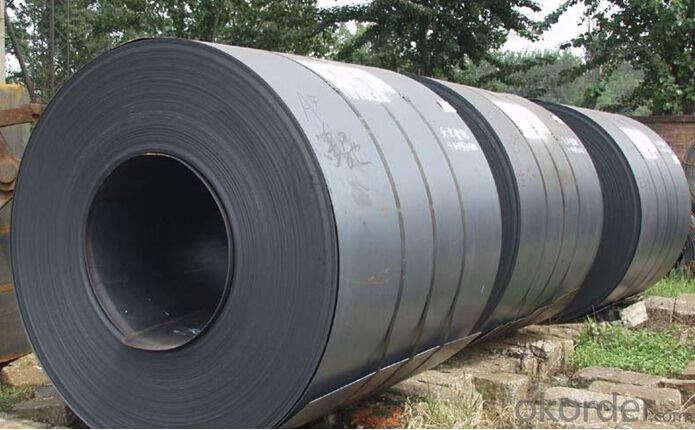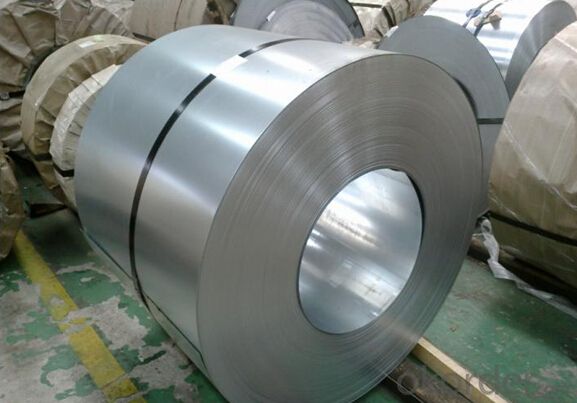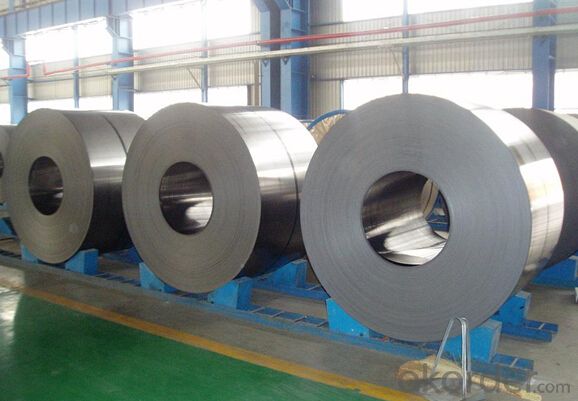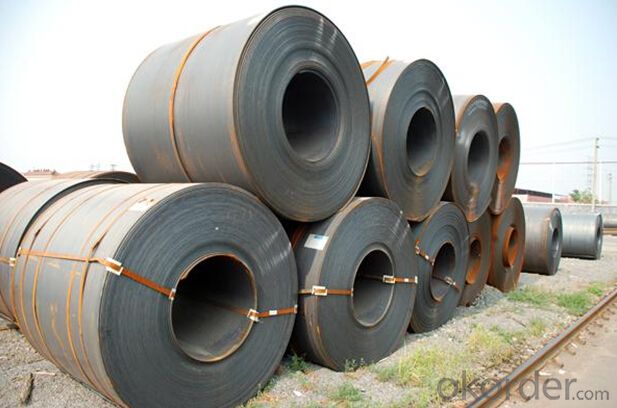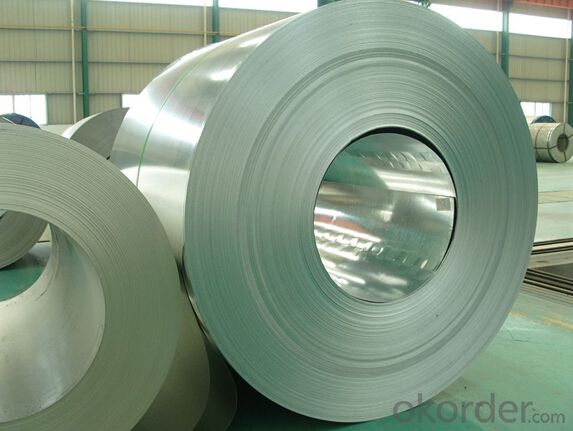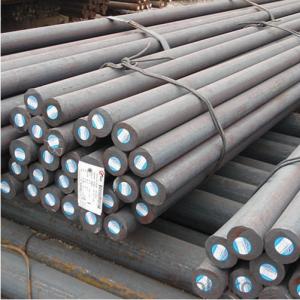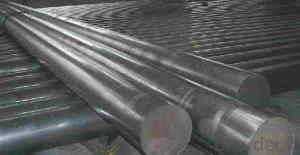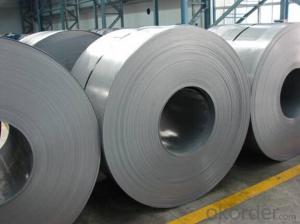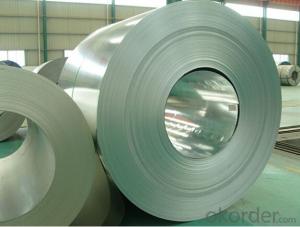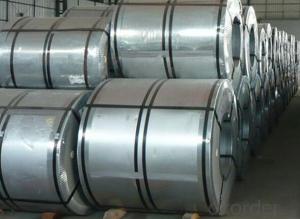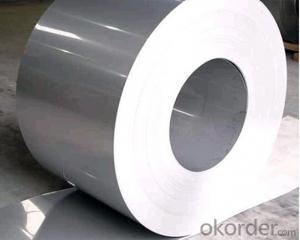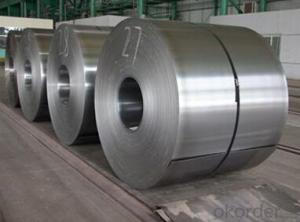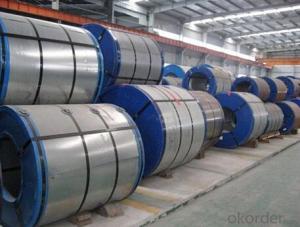Grade JIS G3135-SPFC 390 Galvanized Steel Coil
- Loading Port:
- Tianjin
- Payment Terms:
- TT OR LC
- Min Order Qty:
- 3 m.t.
- Supply Capability:
- 10000 m.t./month
OKorder Service Pledge
OKorder Financial Service
You Might Also Like
Specification
Grade JIS G3135-SPFC 390 Galvanized Steel Coil
Specification of Grade JIS G3135-SPFC 390Galvanized Steel Coil
1. Galvanized Steel Coil
(1) Width: 600-1570mm
(2) Thickness: 0.13-5.0mm
(3) Grade: JIS G3302-SGCC-SGC570, SGCH (full hard-G550), SGHC-SGH540
EN10346-DX51D+Z, DX53D+Z, S250GD-S550GD
ASTM A653-CS-B, SS255-SS550
(4) Zinc Coating: Z40g/m2~Z500g/m2 (both side total coating thickness)
2. Galvalume Steel Coil
(1) Width: 600~1500mm
(2) Thickness: 0.15~2.30mm
(3) Grade: JIS G3321-SGLCC, SGLC400-570, (G550)
EN10346-DX51D+AZ, DX53D+AZ, S250-S550
ASTM A792M CS-B, SS255-SS550
(4) AZ Coating: AZ50~AZ185g/m2
3. Prepainted Galvanized Steel Coil (PPGI)
(1) Width: 600~1250mm
(2) Thickness: 0.19~1.50mm
(3) Grade: JIS G3312-CGCC, CGC340-570, (G550)
ASTM A755M CS-B, SS255-SS550
(4) Zinc Coating: Z40g/m2~Z500g/m2 (both side total coating thickness)
4. Prepainted Galvanized Steel Coil (PPGL)
(1) Width: 600~1250mm
(2) Thickness: 0.20~1.50mm
(3) Grade: JIS G3322-CGLCC, CGLC340-570, (G550)
ASTM A755M CS-B, SS255-SS550
(4) AZ Coating: AZ50~AZ185g/m2 (both side total coating thickness)
5. Cold Rolled Steel Coil (Soft) (for further information, pls click the product name)
(1) Width: 600~1570mm
(2) Thickness: 0.13~2.50mm
(3) Grade: JIS G3141-SPCC-SD, SPCD-SD, SPEC-SD
JIS G3135-SPFC 340/390/440
EN10130-DC01, DC03, DC04
SAE1006, SAE1008
ASTM A424-TypeⅡ
6. Cold Rolled Steel Coil (Full Hard) (for further information, pls click the product name)
(1) Width: 600~1570mm
(2) Thickness: 0.13~2.50mm
(3) Grade: JIS G3141-SPCC-1B, SPCC-1D
7. Hot Rolled Steel Coil
(1) Width: 1000~1524mm
(2) Thickness: 1.20~16.5mm, other thickness can be negotiation
(3) Grade: JIS G3101-SS400, JIS G3132-SPHT1/2/3, ASTM A36, Q195, Q235 etc.
Company Introduction of the Grade JIS G3135-SPFC 390 Galvanized Steel Coil
CNBM International Corporation is the most import and export platform of CNBM group(China National Building Material Group Corporation) ,which is a state-owned enterprise, ranked in 270th of Fortune Global 500 in 2015.
With its advantages, CNBM International are mainly concentrate on Cement, Glass, Iron and Steel, Ceramics industries and devotes herself for supplying high quality series of refractories as well as technical consultancies and logistics solution.
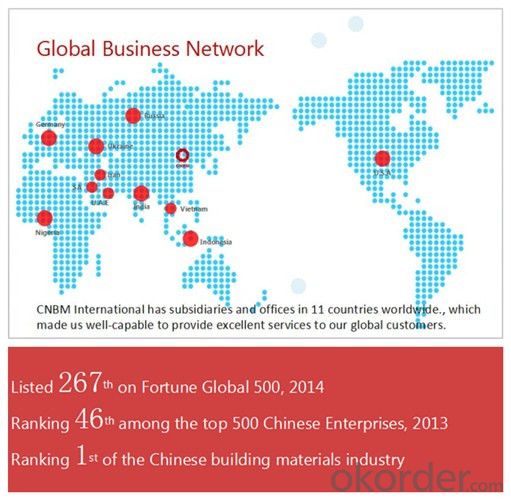
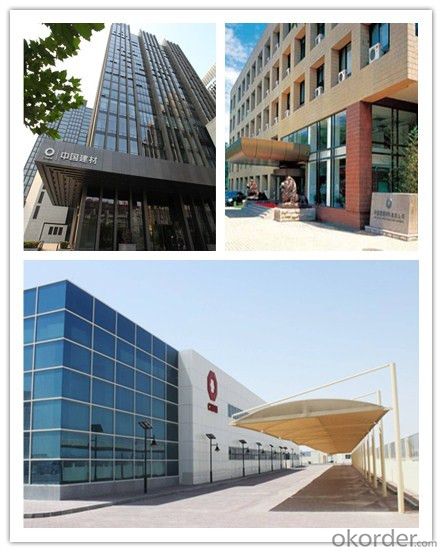
Packaging & Delivery of the Grade JIS G3135-SPFC 390 Galvanized Steel Coil
Packaging Detail | Sea worthy packing /as per customer's packing instruction |
Delivery Detail | 15 ~ 40 days after receiving the deposit |
Products Show:
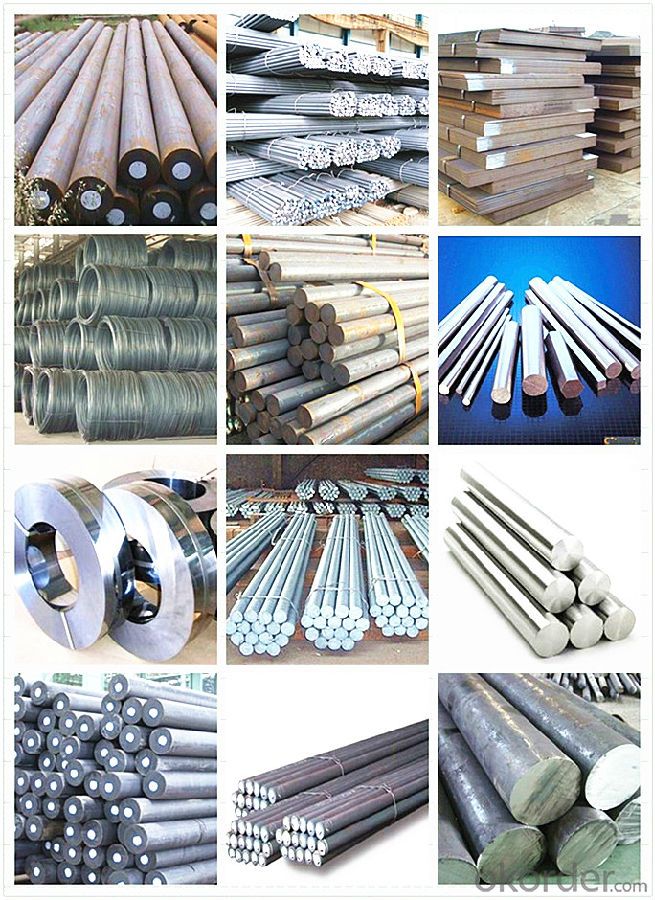
FAQ:
Are you a trading company or manufacturer? | Manufacturer |
What’s the MOQ? | 3 metric ton |
What’s your delivery time? | 15-35 days after downpayment received |
Do you Accept OEM service? | Yes |
what’s your delivery terms? | FOB/CFR/CIF |
What's the Payment Terms? | 30% as deposit,70% before shipment by T/T |
Western Union acceptable for small amount. | |
L/C acceptable for large amount. | |
Scrow ,Paybal,Alipay are also ok | |
Why choose us? | Chose happens because of quality, then price, We can give you both. Additionally, we can also offer professional products inquiry, products knowledge train (for agents), smooth goods delivery, excellent customer solution proposals. |
What's your available port of Shipment? | Main Port, China |
What’s your featured services? | Our service formula: good quality+ good price+ good service=customer's trust
|
Where are your Market? | Covering more than 160 countries in the world |
- Q: What are the different processes involved in making special steel?
- The different processes involved in making special steel include melting and refining the raw materials, such as iron ore and scrap metal, in a furnace to create liquid steel. This liquid steel is then cast into various shapes using techniques like continuous casting or ingot casting. After casting, the steel undergoes heat treatment processes like annealing, quenching, and tempering to enhance its mechanical properties. Additionally, special alloying elements are added during the melting stage to give the steel specific characteristics, such as increased strength or corrosion resistance. Finally, the steel is finished by processes like machining, grinding, and polishing to meet the desired specifications and quality standards.
- Q: What are the properties of high-strength stainless steel?
- High-strength stainless steel possesses several key properties. Firstly, it exhibits excellent corrosion resistance, making it highly resistant to rust and other forms of chemical degradation. Additionally, it has exceptional strength and durability, allowing it to withstand high levels of stress and pressure without deformation or failure. Furthermore, it retains its mechanical properties even at elevated temperatures, making it suitable for use in extreme environments. Lastly, high-strength stainless steel is often non-magnetic, providing advantages in certain applications where magnetic interference needs to be minimized.
- Q: What are the different shapes and forms in which special steel is available?
- Special steel is available in various shapes and forms to cater to different industrial and engineering applications. Some common shapes and forms of special steel include: 1. Bars: Special steel bars are widely used in construction, automotive, and machinery industries. They are available in round, square, hexagonal, and flat shapes, offering flexibility in design and ease of machining. 2. Sheets and Plates: Special steel sheets and plates are used in manufacturing various components and structures that require high strength and durability. They are available in different thicknesses and sizes, making them suitable for diverse applications. 3. Tubes and Pipes: Special steel tubes and pipes are commonly used in industries such as oil and gas, construction, and automotive. They come in various dimensions and can be seamless or welded, catering to specific requirements. 4. Wire: Special steel wire is widely used in manufacturing springs, cables, fasteners, and other products that require high tensile strength and resistance to corrosion. It is available in different diameters and can be further processed through processes like drawing or annealing. 5. Forgings: Special steel can also be obtained in the form of forgings, which are shaped through controlled heating and mechanical pressure. Forgings offer excellent strength and toughness, making them suitable for critical components in aerospace, power generation, and heavy machinery industries. 6. Castings: Special steel castings are produced by melting the steel and pouring it into molds. This allows for the production of complex shapes and intricate details, making castings ideal for applications in the automotive, energy, and mining sectors. 7. Profiles: Special steel profiles are customized shapes that are specifically designed to meet unique engineering requirements. They can be extruded, rolled, or cold-drawn, and are widely used in industries such as construction, transportation, and manufacturing. These are just some of the many shapes and forms in which special steel is available. The choice of shape and form depends on the specific application and the desired mechanical properties required for the end product.
- Q: How does special steel perform in high-temperature environments?
- Special steel performs exceptionally well in high-temperature environments. It has a high melting point, excellent resistance to heat and thermal shock, and can retain its strength and hardness even at elevated temperatures. This makes it highly suitable for applications such as aerospace, power generation, and automotive industries, where materials are exposed to extreme heat and require exceptional performance and durability.
- Q: What is the significance of special steel in the medical field?
- Special steel is of great significance in the medical field due to its unique properties and characteristics. It is used to manufacture surgical instruments, implants, and medical devices that require high strength, corrosion resistance, and biocompatibility. Special steel ensures the safety and effectiveness of medical interventions, contributing to improved patient outcomes and overall healthcare advancements.
- Q: How does special steel contribute to the aerospace structural industry?
- Special steel plays a crucial role in the aerospace structural industry by offering exceptional strength, durability, and heat resistance. It is used extensively in the manufacturing of aircraft components such as landing gears, engine parts, and structural frames. The high tensile strength and corrosion resistance of special steel ensure the integrity and safety of the aircraft, enabling it to withstand extreme conditions and stress encountered during flight. Additionally, special steel's lightweight nature allows for increased fuel efficiency, reducing operational costs and environmental impact in the aerospace industry.
- Q: What is the difference between special steel and regular steel?
- Special steel refers to a specific type of steel that is designed and manufactured to possess enhanced properties compared to regular steel. These enhanced properties can include higher strength, improved corrosion resistance, better heat resistance, or increased hardness. Special steel is often used in applications where standard steel may not meet the required specifications or performance demands.
- Q: How does special steel contribute to the automotive racing machinery industry?
- The automotive racing machinery industry greatly relies on special steel to enhance the performance, durability, and safety of racing vehicles. One significant benefit of special steel is its ability to boost the power and speed of racing cars. Steel alloys like carbon fiber-reinforced steel or high-strength steel offer exceptional strength-to-weight ratios, enabling manufacturers to reduce vehicle weight without compromising structural integrity. This weight reduction enhances acceleration and maneuverability, resulting in increased speed and improved lap times on the track. Apart from performance improvements, special steel also makes racing vehicles safer. Certain steel alloys possess high strength and impact resistance, making them ideal for constructing roll cages, chassis, and other critical safety components. These materials can withstand extreme forces during crashes or collisions, providing enhanced protection for drivers and minimizing the risk of severe injuries. Special steel also contributes to the longevity and durability of automotive racing machinery. The demanding conditions of racing, including high temperatures, vibrations, and mechanical stress, can quickly deform or deteriorate regular steel. However, special steel alloys are specifically engineered to withstand these harsh environments, ensuring racing cars can withstand the sport's rigorous demands without compromising performance or safety. Furthermore, special steel alloys offer excellent thermal conductivity and heat resistance, which are essential for racing vehicles that generate substantial heat during high-speed runs. By efficiently dissipating heat, special steel helps prevent overheating and ensures optimal engine performance, minimizing the risk of mechanical failures and maximizing the lifespan of racing machinery. In summary, special steel significantly contributes to the automotive racing machinery industry by enhancing the performance, durability, and safety of racing vehicles. The use of high-performance steel alloys increases speed, improves lap times, and reduces vehicle weight. Additionally, it provides superior strength and impact resistance, enhancing safety during crashes or collisions. Moreover, special steel alloys offer excellent heat resistance and thermal conductivity, ensuring optimal engine performance and prolonging the lifespan of racing machinery.
- Q: How does special steel perform in high-wear applications?
- Special steel is specifically designed to withstand high-wear applications due to its exceptional hardness, toughness, and resistance to deformation. It exhibits superior performance by maintaining its shape, strength, and durability even under extreme conditions such as friction, abrasion, and impact. This makes it an ideal choice for industries where wear resistance is crucial, such as automotive, construction, mining, and manufacturing.
- Q: How does special steel contribute to the defense aftermarket industry?
- Special steel plays a crucial role in the defense aftermarket industry by providing high-quality materials that are essential for the production of various defense equipment and components. The unique properties of special steel, such as its exceptional strength, durability, and resistance to corrosion and extreme temperatures, make it a preferred choice for manufacturing military vehicles, aircraft, weapons, and other defense systems. One of the key ways in which special steel contributes to the defense aftermarket industry is through its use in armor and ballistic protection. Special steel alloys are utilized to create armor plates and panels that can withstand high-velocity impacts and protect military personnel and vehicles from enemy fire. These materials offer enhanced protection levels, reducing the risk of casualties and damage during combat. Moreover, special steel is also employed in the production of aerospace components. The defense industry heavily relies on aircraft for various operations, including reconnaissance, surveillance, and combat. Special steel alloys are used to manufacture critical components such as landing gear, engine parts, and structural elements, ensuring the safety, reliability, and performance of military aircraft. Furthermore, special steel's resistance to corrosion and extreme conditions makes it suitable for the construction of naval vessels and submarines. These naval assets operate in harsh marine environments, exposed to saltwater, extreme temperatures, and constant mechanical stress. Special steel alloys with high-strength properties and corrosion resistance are utilized in the construction of ship hulls, propeller shafts, and other critical components, ensuring longevity and operational effectiveness. In addition to its direct applications, special steel also contributes to the defense aftermarket industry through its role in the supply chain. The production of defense equipment and components often requires highly specialized machinery and tools, which are made from special steel. The availability of these materials is essential for maintaining a robust defense industry, enabling the efficient production and maintenance of defense systems. Overall, special steel plays a vital role in the defense aftermarket industry by providing the necessary materials for the production of high-performance, reliable, and durable defense equipment. Its unique properties contribute to the safety, effectiveness, and longevity of military vehicles, aircraft, weapons, and naval vessels, ultimately enhancing the capabilities of defense forces around the world.
Send your message to us
Grade JIS G3135-SPFC 390 Galvanized Steel Coil
- Loading Port:
- Tianjin
- Payment Terms:
- TT OR LC
- Min Order Qty:
- 3 m.t.
- Supply Capability:
- 10000 m.t./month
OKorder Service Pledge
OKorder Financial Service
Similar products
Hot products
Hot Searches
Related keywords
